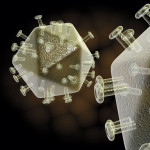A small study has shed new light on an apparent driver of harmful chronic inflammation among people receiving HIV treatment: the production of new copies of viral RNA from otherwise resting cells infected with the virus.
The study, which was led by researchers at Boston Medical Center and published in the Journal of Infectious Diseases, found that the amount of HIV encoded into the genome of such cells was not associated with inflammation.
Researchers believe that the chronic inflammation that HIV fuels—and that persists even when the virus is well treated by antiretrovirals (ARVs)—is behind the increased rates of various health problems associated with aging in the HIV population, including cardiovascular disease, cognitive decline and various cancers.
When HIV’s genetic material is encoded into the DNA of long-lived, resting cells, it remains under the radar of ARVs because such medications work only on cells that are actively churning out new copies of the virus. Collectively, these cells make up what is known as the viral reservoir, the existence of which makes curing the virus so extremely difficult.
The authors of the new study enrolled 57 people with well-treated HIV who were in two age cohorts: younger than 35 and 50 and older. They analyzed markers of inflammation in their plasma, the levels of HIV encoded into the genomes of their reservoir cells, and the capacity for their reservoir cells to produce new copies of viral RNA.
Compared with the younger individuals, the older ones had higher levels of inflammation and a trend toward more virus harbored in their reservoir cells.
Inflammation was associated with the production of HIV RNA in reservoir cells but not with the transcription of the viral genome into the DNA of such cells in the first place.
“Our findings suggest that novel treatments are needed to target the inflammation persistent in people living with HIV,” said Manish Sagar, MD, an infectious diseases physician and researcher at Boston Medical Center and the study’s corresponding author. “Current antiretroviral drugs prevent new infection, but they do not prevent HIV RNA production, which our results point [to] as a potential key factor driving inflammation in people living with HIV.”
To read a press release about the study, click here.
To read the study abstract, click here.







2 Comments
2 Comments